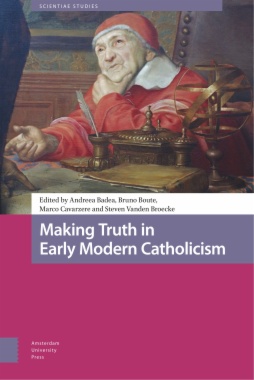Scholarship has come to value the uncertainties haunting early modern knowledge cultures; indeed, awareness of the fragility and plurality of knowledge is now offered as a key element for understanding early modern science as a whole. Yet early modern actors never questioned the possibility of certainty itself and never objected to the notion that truth is out there, universal, and therefore safe from human manipulation. This book investigates how early modern actors managed not to succumb to postmodern relativism, despite the increasing uncertainties and blatant disagreements about the nature of God, Man, and the Universe. An international and interdisciplinary team of experts in fields ranging from the history of science to theology and the history of ideas analyses a number of practices that were central to maintaining and functionalizing the notion of absolute truth. Through such an interdisciplinary research the book shows how certainty about truth could be achieved, and how early modern society recognized the credibility of a wide plethora of actors in differentiating fields of knowledge.
- Cover
- Table of Contents
- A Product’s Glamour. Credibility, or the Manufacture and Administration of Truth in Early Modern Catholicism
- Bruno Boute, Andreea Badea, Marco Cavarzere, and Steven Vanden Broecke
- Part I: Accommodating
- 1. Scholastic Approaches to Reasonable Disagreement
- 2. Regulating the Credibility of Non-Christians: Oaths on False Gods and Seventeenth-Century Casuistry
- 3. How to Be a Catholic Copernican in the Spanish Netherlands
- 4. Appearance and Essence: Speaking the Truth about the Body in the Early Modern Catholic Church
- Part II: Performing
- 5. Saving Truth: Roman Censorship and Catholic Pluralization in the Confessionals of the Habsburg Netherlands, 1682–1686
- 6. The Production of Truth in the Manufacture of Saints. Procedures, Credibility and Patronage in Early Modern Processes of Canonization
- 7. Credibility of the Past: Writing and Censoring History within Seventeenth-Century Catholicism
- 8. Heresy and Error in the Assessment of Modern Philosophical Psychology
- 9. Modern Philosophy and Ancient Heresies: New Wine in Old Bottles?
- Part III: Embedding
- 10. Experiences Are Not Successful Accompaniments to Knowledge of the Truth
- 11. Choosing Information, Selecting Truth: The Roman Congregations, the Benedictine Declaration, and the Establishment of Religious Plurality
- 12. Disciplining the Sciences in Conflict Zones: Pre-Classical Mechanics between the Sovereign State and the Reformed Catholic Religion
- Index

